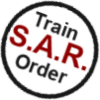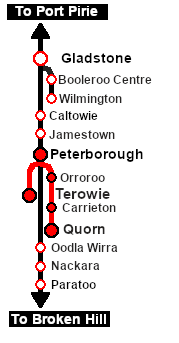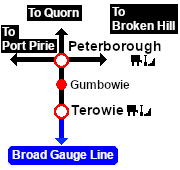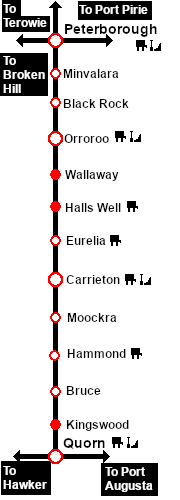
1 |
2 Vintage East-West Express: Terowie to Port Augusta Passenger
A scenario in the SAR Peterborough Base Session v2.0
This scenario has been updated in V2.0. For the original V1.0 scenario, click here |

3 |
| A limited stop passenger service between Terowie and Quorn. |
 |
|
The Historical Bit
From 1917 to 1932 the Terowie-Peterborough-Quorn-Port Augusta Line was a vital part of the transcontinental rail link between Sydney, NSW on the east coast and Perth, WA on the west coast.
The South Australian Railways provided an express passenger service, the East-West Express, that ran between Terowie and Port Augusta via Quorn. The name "East-West" came from its role in connecting the eastern side of the continent to the western side - in reality the service ran mostly North-South. The return service, from Port Augusta to Terowie, was called the West-East Express.
At Terowie it connected with broad gauge (5ft 3in - 1600mm) services from Adelaide. At Peterborough it connected with narrow gauge services from Broken Hill where there was a standard gauge (4ft 8½in - 1435mm) connection from Sydney. At Quorn it connected with narrow gauge services from the Central Australia Railway . At Port Augusta it connected with the standard gauge Trans Continental Railway to Kalgoolie, where there was a narrow gauge connection to Perth.
Passengers making the entire trip from Sydney to Perth would:-
- change trains 5 times - at Parkes NSW, Broken Hill NSW, Peterborough SA, Port Augusta SA and Kalgoolie WA plus take a taxi between the standard gauge and narrow gauge stations in Broken Hill
- change track gauges 3 times - standard gauge to narrow at Broken Hill, narrow gauge back to standard at Port Augusta and standard gauge to narrow at Kalgoolie
- navigate through 5 different rail systems - NSWGR, Silverton Tramway, SAR, Commonwealth Railways and WAGR
The entire journey, from coast to coast, could take 6 days.
In 1932 a more direct broad gauge line from Adelaide to Port Augusta via Port Pirie was completed. This cut nearly 70 miles (113km) off the journey. The East-West Express then ran as a broad gauge service from Adelaide directly to Port Augusta although an express passenger service continued to run between Terowie and Port Augusta until 1937. In 1970 the narrow and broad gauge lines from Broken Hill to Port Pirie, Port Pirie to Port Augusta and Kalgoolie to Perth were converted to standard gauge, making an unbroken standard gauge line from coast to coast. This was followed a few years later by the conversion of the broad gauge line from Adelaide to Port Pirie to standard gauge.
Today passengers can board a luxury train, the Indian Pacific, in Sydney and travel the entire distance to Perth via Adelaide in 3 days without leaving the train or changing gauge. |
When, Where and With What
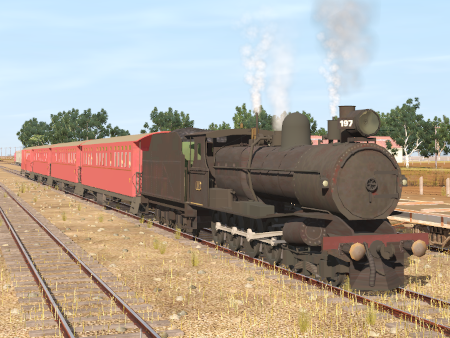 |
| Era: |
1917 to 1930s |
| Duration: |
4 hours |
| Loco: |
SAR T 197 at Terowie Tranfer Yards |
| Available at Peterborough Loco Depot for an optional loco swap:- |
|
|
| Consist: |
Attached to SAR T 197
|
|
|
Similar/Related Scenarios
 |
Each location in the layout has a detailed set of track diagrams that provide a variety of useful information
The Getting Started guide below gives a summary of what is available.
To display this information click any  graphic, or go to the bottom of the page for all the session links (all links will open in this window). graphic, or go to the bottom of the page for all the session links (all links will open in this window). |
Getting Started:
- If you have already closed the opening message window then the first step is to pause the session by pressing the P key.
- If you decide to set the session clock to a different starting time then follow the instructions shown in the Orders section
- Next locate your loco. Either:-
- Open the Finder Tool (press Ctrl F ) and type, in the Name field, the name of the loco, in this case SAR T 197 (or just T 197 should be enough). Click the tick icon, OR
- Open the Driver List (bottom left of the screen) and then scroll through the list to find either:-
- the loco name (SAR T 197) OR
- the driver icon (named Driver 197) - this is a non-animated icon
- then click the drivers Eye icon
 to take control of the loco to take control of the loco
- Take a few moments to get your bearings. Use the
 (this link will open in this window) to load its location details and track plans. In each location details page:- (this link will open in this window) to load its location details and track plans. In each location details page:-
- the
 tab gives an overall summary of each location with a "potted" history (where available). tab gives an overall summary of each location with a "potted" history (where available).
- the
 tab reveals the invisible tab reveals the invisible  Track Marks for Drive To commands. Track Marks for Drive To commands.
- the
 tab lists all active industries and their commodities. tab lists all active industries and their commodities.
- the
 tab describes the names, locations and settings of all junction switches as well as some switch sets you may want to use. tab describes the names, locations and settings of all junction switches as well as some switch sets you may want to use.
- Each location details page has direct links to the adjacent locations so you can explore along the route.
- When you are ready to start, reload the Peterborough Base Session page (click the Scenarios button on your current location page) and select this Scenario again or just use the Back button on your browser - whichever is quicker.
- Switch back to Trainz Driver Mode
- Close the opening message window and, if Pause is shown on the screen, press the P key to start the session.
|
|
Tutorial:
 |
A tutorial on using these scenarios is provided in the link on the left. The link will open in this window |
|
| bold time = arrive/depart time |
plain time = timing point |
| Service Symbols: |
| L Load |
U Unload |
A Attach wagons |
D Detach wagons |
| S Stable loco |
a on request stop |
c coal (if required) |
r passenger refreshment stop |
| s swap locos (if required) |
w water (if required) |
| † connects with broad gauge service to/from Adelaide |
‡ connects with narrow gauge service to/from Port Pirie/Broken Hill |
| 1 cross train 212 |
2 cross train 141 |
|
| Location Symbols: |
| Δ = Turning Triangle |
C = Loco Coal Loader |
E = Engine Depot |
F = Fixed Signals |
| J = Junction |
Ø = Loco Turntable |
W = Loco Water Tank |
X = Crossing Loop |
|
|
|
This page was created by Trainz user pware in February 2021 and was last updated as shown below.







